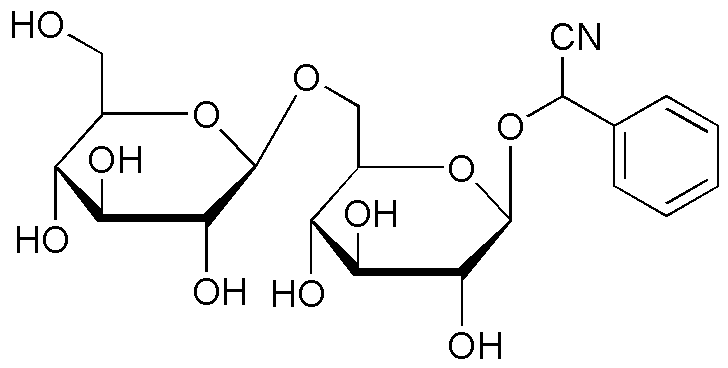Amygdalin is widely utilized in research focused on various applications:
- Natural Health Products: Commonly found in apricot kernels, amygdalin is marketed as a dietary supplement, believed by some to support immune health and overall wellness.
- Cancer Research: Investigated for its potential anti-cancer properties, amygdalin is studied in alternative medicine, although scientific consensus on its efficacy remains debated.
- Pharmaceutical Development: Used as a starting material in the synthesis of other compounds, amygdalin serves as a valuable intermediate in pharmaceutical research.
- Flavoring Agent: Its natural flavor profile makes amygdalin a candidate for use in food products, particularly in creating almond-flavored items.
- Cosmetic Applications: Due to its antioxidant properties, amygdalin is explored in skincare formulations aimed at promoting skin health and reducing signs of aging.
Informations générales
Propriétés
Sécurité et réglementation
Applications
Amygdalin is widely utilized in research focused on various applications:
- Natural Health Products: Commonly found in apricot kernels, amygdalin is marketed as a dietary supplement, believed by some to support immune health and overall wellness.
- Cancer Research: Investigated for its potential anti-cancer properties, amygdalin is studied in alternative medicine, although scientific consensus on its efficacy remains debated.
- Pharmaceutical Development: Used as a starting material in the synthesis of other compounds, amygdalin serves as a valuable intermediate in pharmaceutical research.
- Flavoring Agent: Its natural flavor profile makes amygdalin a candidate for use in food products, particularly in creating almond-flavored items.
- Cosmetic Applications: Due to its antioxidant properties, amygdalin is explored in skincare formulations aimed at promoting skin health and reducing signs of aging.
Documents
Fiches de données de sécurité (FDS)
La FDS fournit des informations de sécurité complètes sur la manipulation, le stockage et l’élimination du produit.
Spécifications du produit (PS)
Le PS fournit une description complète des propriétés du produit, notamment sa composition chimique, son état physique, sa pureté et les exigences de stockage. Il détaille également les plages de qualité acceptables et les applications prévues du produit.
Certificats d'analyse (COA)
Recherchez des certificats d'analyse (COA) en saisissant le numéro de lot du produit. Les numéros de lot et de lot se trouvent sur l'étiquette d'un produit, après les mots « Lot » ou « Lot de fabrication ».
Numéro de catalogue
Numéro de lot/série
Certificats d'origine (COO)
Ce certificat d'exploitation confirme le pays dans lequel le produit a été fabriqué, et détaille également les matériaux et composants utilisés et s'il est issu de sources naturelles, synthétiques ou autres sources spécifiques. Ce certificat peut être requis pour les douanes, le commerce et la conformité réglementaire.
Numéro de catalogue
Numéro de lot/série
Fiches de données de sécurité (FDS)
La FDS fournit des informations de sécurité complètes sur la manipulation, le stockage et l’élimination du produit.
DownloadSpécifications du produit (PS)
Le PS fournit une description complète des propriétés du produit, notamment sa composition chimique, son état physique, sa pureté et les exigences de stockage. Il détaille également les plages de qualité acceptables et les applications prévues du produit.
DownloadCertificats d'analyse (COA)
Recherchez des certificats d'analyse (COA) en saisissant le numéro de lot du produit. Les numéros de lot et de lot se trouvent sur l'étiquette d'un produit, après les mots « Lot » ou « Lot de fabrication ».
Numéro de catalogue
Numéro de lot/série
Certificats d'origine (COO)
Ce certificat d'exploitation confirme le pays dans lequel le produit a été fabriqué, et détaille également les matériaux et composants utilisés et s'il est issu de sources naturelles, synthétiques ou autres sources spécifiques. Ce certificat peut être requis pour les douanes, le commerce et la conformité réglementaire.


